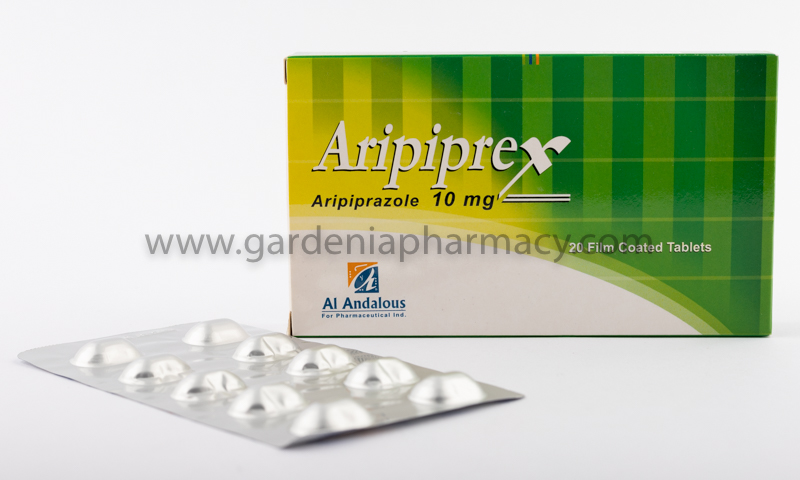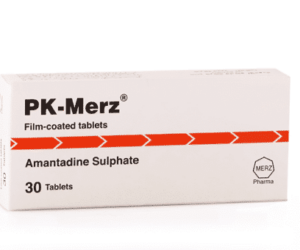ARIPIPREX 10MG 20TAB; aripiprazole, antipsychotics .
ACTIVE-INGREDIENT OF ARIPIPREX 10MG 20TAB
Aripiprazole 10 mg.
INDICATION OF ARIPIPREX 10MG 20TAB
ARIPIPREX Oral Tablets and Oral Solution are indicated for the treatment of: Schizophrenia. Acute Treatment of Manic and Mixed Episodes associated with Bipolar I Disorder. Adjunctive Treatment of Major Depressive Disorder. Irritability Associated with Autistic Disorder. Treatment of Tourette’s Disorder. ARIPIPREX Injection is indicated for the treatment of: Agitation associated with schizophrenia or bipolar mania.
DOSAGE OF ARIPIPREX 10MG 20TAB
Follow all directions given to you by your pharmacist or doctor carefully . They may differ from the information contained in this leaflet
Ask your pharmacist or doctor for help if you do not understand the instructions on the box .
The recommended dose is : –
2.1 Scizophrenia. Adults: The recommended starting and target dose of ARIPIPREX is 10 or 15 mg/day administered on a once-a-day schedule without regard to meals. ARIPIPREX has been systemically evaluated and shown to be effective in a dose range of 10 to 30 mg/day, when administered as the tablet formultion; however, doses higher than 10 or 15 mg/day were not more effective than 10 or 15 mg/day. Dosage increases should generally not be made before 2 weeks, the time needed to achieve steady-state. Maintenance Treatment: Maintenance of efficacy in schizophrenia was demonstrated in a trial involving patients with schizophrenia who had been symptomatically stable on other antipsychotic medications for periods of 3 months or longer. These patients were discontinued from those medications and randomized to either Aripiprazole 15 mg/day or placebo, and observed for relapse. Patients should be periodically reassessed to determine the continued need for maintenance treatment. Adolescents: The recommended target dose of ARIPIPREX is 10 mg/day. Aripiprazole was studied in adolescent patients 13 to 17 years of age with schizophrenia at daily doses of 10 mg and 30 mg. The starting daily dose of tablet formulation in these patients was 2 mg, which was titrated to 5 mg after 2 days and to the target dose of 10 mg after 2 additional days. Subsequent dose increases should be administered in 5 mg increments. The 30 mg/day dose was not shown to be more efficacious than the 10 mg/day dose. ARIPIPREX can be administered without regard to meals. Patients should be periodically reassessed to determine the need for maintenance treatment. Switching from Other Antipsychotics: There are no systemically collected data to specifically address switching patients with schizophrenia from other antipsychotics to aripiprazole or concerning concomitant administration with other antipsychotics. While immediate discontinuation of the previous antipsychotic treatment may be acceptable for some patients with schizophrenia, more gradual discontinuation may be most appropriate for others. In all cases, the period of overlapping antipsychotic administration should be minimized. 2.2 Bipolar I Disorder Acute Treatment of Manic and Mixed Episodes: Adults : The recommended starting dose in adults is 15 mg given once daily as monotherapy and 10 mg to 15 mg given once daily as adjunctive therapy with lithium or valproate. ARIPIPREX can be given without regard to meals. The recommended target dose of ARIPIPREX is 15 mg/day, as monotherapy or as adjunctive therapy with lithium or valproate. The dose may be increased to 30 mg/day based on clinical response. The safety of doses above 30 mg/day has not been evaluated in clinical trials. Pediatrics: The recommended starting dose in pediatric patients (10 to 17 years) as monotherapy is 2 mg/day, with titration to 5 mg/day after 2 days, and a target dose of 10 mg/day after 2 additional days. Recommended dosing an adjunctive therapy to lithium or valproate is the same. Subsequent dose increases, if needed, should be administered in 5 mg/day increments. ARIPIPREX can be given without regard to meals. Adjunctive Treatment of Major Depressive Disorder : Adults: The recommended dose for Aripprazole as adjunctive treatment for patients already taking an antidepressant is 2 to 5 mg/day. The recommended dose range is 2 to 15 mg/day. Dosage adjustements of up to 5 mg/day should occur gradually, at intervals of no less than 1 week. Patients should be periodically reassessed to determine the continued need for maintenance treatment. Irritability Associated with Autistic Disorder. Pediatric patients(6 to 17 years): The recommended dosage range for the treatment of pediatric patients with irritability associated with autistic disorder is 5 to 15 mg/day. Dosing should be initiated to 2 mg/day. The dose should be increased to 5 mg/day, with subsequent increases to 10 or 15 mg/day. if needed . Dose adjustments of up to 5 mg/day should occur gradually, at intervals of no less than 1 week. Patients should be periodically reassessed to determine the continued need for maintaenance treatment. -tourette’s ddisorder : – pediatric patients(6 to 18 years ) the recommended dosage range for tourette’s diorder is 5 to 20 mg/day . For patients weighting less than 50 kg , dosing should be intiated at 2 mg/ day with a target dose of 5 mg / day after 2 days . The dose can be increased to 10 mg/day in patients who do not achieve optimal control of tics . dosage adjustments should occur gradually at intervals of no less than 1 week . for patients weighting 50 kg or more , dosing should be intiated at 2 mg/day for 2 days , and then increased to 5 mg / day for 5 days , with a target dose of 10 mg /day on day 8 . the dose can be increased up to 20 mg /day for patients who do not achieve optimal control of tics. dosage adjustments should occur gradually in increaments of 5 mg/day at intervals of no less than 1 week . patients should be periodically reassessed to determine the continued need for maintenance treatment . – agitation associated with schizophrenia or bipolarmania ( intramuscular injection ) : -adults : the recommended dose in these patients is 9.75 mg . the recommended dosage range is 5.25 to 15 . no additional benefit was demonstrated for 15 mg compared to 9.75 mg . a lower dose of 2.25 mg may be considered when clinical factors warrant. if agitation warranting a second dose persists following the initial dose , cumulative dose up to a total of 30 mg/day may be given . however, the efficacy of repeated doses of aripiprex injection in agitated patients has not been adequately evaluated in clinical trials . the safety of total daily doses greater than 30 mg or injections given more frequently than every 2 hours have not been adequately evaluated in clinical trials . if ongoing ARIPIPREX therapy is clinically indicated , oral ARIPIPREX in a range of 10 to 30 mg/day should replace ARIPIPREX injection as soon as possible . patients(6 to 18 years ) the recommended dosage range for tourette’s diorder is 5 to 20 mg/day . For patients weighting less than 50 kg , dosing should be intiated at 2 mg/ day with a target dose of 5 mg / day after 2 days . The dose can be increased to 10 mg/day in patients who do not achieve optimal control of tics . dosage adjustments should occur gradually at intervals of no less than 1 week . for patients weighting 50 kg or more , dosing should be intiated at 2 mg/day for 2 days , and then increased to 5 mg / day for 5 days , with a target dose of 10 mg /day on day 8 . the dose can be increased up to 20 mg /day for patients who do not achieve optimal control of tics. dosage adjustments should occur gradually in increaments of 5 mg/day at intervals of no less than 1 week . patients should be periodically reassessed to determine the continued need for maintenance treatment . – agitation associated with schizophrenia or bipolarmania ( intramuscular injection ) : -adults : the recommended dose in these patients is 9.75 mg . the recommended dosage range is 5.25 to 15 . no additional benefit was demonstrated for 15 mg compared to 9.75 mg . a lower dose of 2.25 mg may be considered when clinical factors warrant. if agitation warranting a second dose persists following the initial dose , cumulative dose up to a total of 30 mg/day may be given . however, the efficacy of repeated doses of aripiprex injection in agitated patients has not been adequately evaluated in clinical trials . the safety of total daily doses greater than 30 mg or injections given more frequently than every 2 hours have not been adequately evaluated in clinical trials . if ongoing ARIPIPREX therapy is clinically indicated , oral ARIPIPREX in a range of 10 to 30 mg/day should replace ARIPIPREX injection as soon as possible . – dosage adjustments for cytochrome P450 considerations : dosage adjustmentare recommended in patients who are known CYP2D6 poor metabolizers and in patients taking concomitant CYP3A4 inhibitors or CYP2D6 inhibitors or strong CYP3A4 inducers . when the coadministered drug is withdrawn from the combination therapy , ARIPIPREX dosage should then be adjusted to it is original level . When the coadministered CYP3A4 inducer is withdrawn . ARIPIPREX dosage should be reduced to the original level over 1 to 2 weeks . Patients who may be receiving a combination of strong , moderate , and weak inhibitors of CYP3A4 and CYP2D6 (e.g a strong CYP3A4 inhibitor and a moderate CYP2D6 inhibitor or a moderate CYP3A4 inhibitor with a moderate CYP2D6 inhibitor ) , the dosing may be reduced to one-quarter (25% ) of the usual dose initially and then adjusted to achieve a fovorable clinical response . dose adjustments for ARIPIPREX in patients who are known CYP2D6 poor metabolizers and patients taking concomitant CYP2D6 inhibitors , 3A4 inhibitors, and /or CYP3A4 INDUCERS : -known CYP2D6 poor metabolizers : administer half or usual dose . – known CYP2D6 poor metabolizers taking concomitant strong CYP3A4 inhibitors ( eg. intraconazole , clarithromycin ) : administer a quarter of usual dose . – strong CYP2D6 (e.g quinidine ,fluoxetine , paroxetine ) or CYP3A4 inhibitors ( eg. intraconazole , clarithromycin ) : administer half of usual dose . – strong CYP2D6 and CYP3A4 inhibitors : administer a quarter of usual dose . – strong CYP3A4 inducers ( e.g , carbamazepine , rifampin ) : douple usual dose over 1 to 2 weeks . when adjunctive ARIPIPREX is administered to patients with major depressive disorder , ARIPIPREX should be administered without dosage adjustment as specified in dosage and administration .dose adjustments for ARIPIPREX in patients who are known CYP2D6 poor metabolizers and patients taking concomitant CYP2D6 inhibitors , 3A4 inhibitors, and /or CYP3A4 INDUCERS : -known CYP2D6 poor metabolizers : administer half or usual dose . – known CYP2D6 poor metabolizers taking concomitant strong CYP3A4 inhibitors ( eg. intraconazole , clarithromycin ) : administer a quarter of usual dose . – strong CYP2D6 (e.g quinidine ,fluoxetine , paroxetine ) or CYP3A4 inhibitors ( eg. intraconazole , clarithromycin ) : administer half of usual dose . – strong CYP2D6 and CYP3A4 inhibitors : administer a quarter of usual dose . – strong CYP3A4 inducers ( e.g , carbamazepine , rifampin ) : douple usual dose over 1 to 2 weeks . when adjunctive ARIPIPREX is administered to patients with major depressive disorder , ARIPIPREX should be administered without dosage adjustment as specified in dosage and administration .
OVER-DOSAGE OF ARIPIPREX 10MG 20TAB
MedDRA terminology has been used to classify the adverse reactions. Human experience: Common adverse reactions ( reported in at least 5 % of all overdose cases ) reported with oral aripiprazole overdosage (alone or in combination with other substances) include vomiting, somnolence, and tremor. Other clinically important signs and symptoms observed in one or more patients with Aripiprazole overdoses (alone or with other substances) include acidosis, aggression, asparate aminotransferase increased, atrial fibrillation, bradycardia, coma, confusional state, convulsion, blood creatine phosphokinase increased, depressed level of consciousness, hypertension, hypokalemia, hypotension, lethargy, loss of consciousness, QRS complex prolonged, QT prolonged, pneumonia aspiration, respiratory arrest, statue epilepticus, and tachycardia. Management of overdosage: No specific information is available on the treatment of overdose with Aripiprazole. An electrocardiogram should be obtained in case of overdosage and if QT interval prolongation is present, cardiac monitoring should be instituated. Otherwise, management of overdose should concentrate on supportive therapy, maintaining an adequate airway, oxygenation and ventilation, and management of symptoms. Close medical supervision and monitoring should continue until the patient recovers. Charcoal: In the event of an overdose of ARIPIPREX, an early charcoal administration may be useful in partially preventing the absorption of aripiprazole. Administration of 50 g of activated charcoal, one hour after a single 15 mg oral dose of ARIPIPREX, decreased the mean AUC and Cmax of aripiprazolr by 50 %. Hemodialysis: Although there is no information on the effect of hemodialysis in treating an overdose with Aripiprazole, hemodialysis is unlikely to be useful in overdose management since aripiprazole is highly bound to plasma proteins.
CONTRA-INDICATION OF ARIPIPREX 10MG 20TAB
ARIPIPREX is contraindicated in patients with a history of a hypersensitivity reaction to aripiprazole. Reactions have ranged from pruritus/urticaria to anaphylaxis.
STORAGE OF ARIPIPREX 10MG 20TAB
Store at temperature not exceeding 30 °C in a dry place.
PACK OF ARIPIPREX 10MG 20TAB
ARIPIPREX 10MG 20TAB MANUFACTURED BY
Al Andalous For Pharmaceutical Ind.
https://www.drugs.com/search.php?searchterm=aripiprazole&a=1






Reviews
There are no reviews yet